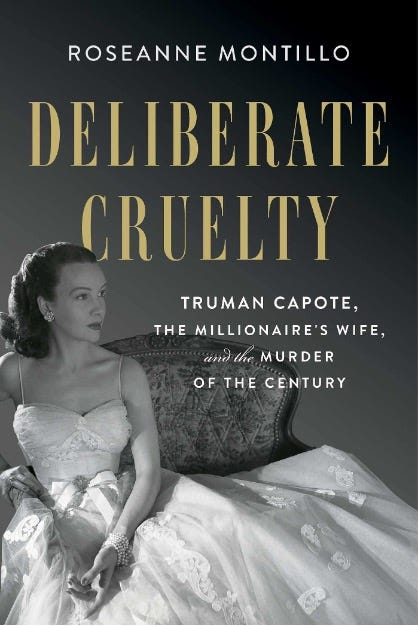Last year at the bookstore a cover caught my eye. The book, Capote’s Women, kicked off a slight fascination with New York high society from the gilded age through mid-century. Something about the scandalous and opulent lives these people lead intrigues me.
I forgot exactly how I found this book, but the recently released Deliberate Cruelty: Truman Capote, the Millionaire's Wife, and the Murder of the Century, by Roseanne Montillo, certainly fit the bill. And just like the other narrative nonfiction books I’ve read in this genre, there was no shortage of strategic status ascendance, infidelity and, this time, murder.
Deliberate Cruelty has the classic high society rags to riches story, which seems quite common in this genre. Women, often coming from normal backgrounds, strategically marrying into riches – as one does in that time – to become high status women in the most elite of social classes in New York.
This particular narrative is focused on Ann Woodward, a poor woman from Kansas who moved to New York, becomes a showgirl, and meets a high status man named William Woodward. Although they engaged in a common affair, William wouldn’t divorce his wife. But he had a son, Billy. William sent Ann to him, and they quickly married. If she couldn’t have the father, she’d happily take the rich son.
As with most marriages in this high society circle, that are utterly depressing in so many ways, the Woodward’s was marked by abuse and infidelity. But the climax of this marriage was when Ann accidently shot her husband in the middle of the night in their own house, mistaking him for an intruder. They obviously slept in separate rooms. But many knew of their rocky marriage, and Ann, suspected of deliberately shooting her husband, was banished by high society and moved to Europe.
Occurring in parallel was the fascinating role of Truman Capote – a high society character who also rose from nothing in the south and ascended the social ladder in New York, becoming the gay confidant of society’s richest women. Except, not Ann. He despised her, perhaps because of how similar they were.
During his late career, the author of Breakfast at Tiffanys was preparing his magnum opus, Answered Prayers: A thinly veiled narrative nonfiction of his own, spilling all the secretes of his high society “swans”, including those of Ann. As excerpts of the book were released after the murder of Billy Woodward, Ann died by suicide, not wanting to live with more pain of ostracization.
Overall, this was a fascinating book if you’re into the genre like I am. It overlaps especially well with Capote’s Women (linked below), and adds another layer to the Capote era. I felt it was a tad disjointed – the story of Ann and Turman – but overall, a nice read. Let me know in the comments any additional recommendations of this genre in the era.
Published: November 2022
Publisher: Atria Books
Format: Audio
If you think this sounds interesting, bookmark these other great reads:
Capote's Women: A True Story of Love, Betrayal, and a Swan Song for an Era by Laurence Leamer (2021). Read my review.
Vanderbilt: The Rise and Fall of an American Dynasty by Anderson Cooper and Katherine Howe (2021). Read my review.
Please note: this post contains affiliate links, allowing me to earn a small commission when you purchase books from the link provided. There is no cost to you, and this will allow me to keep this newsletter free and open to all. Happy reading!






